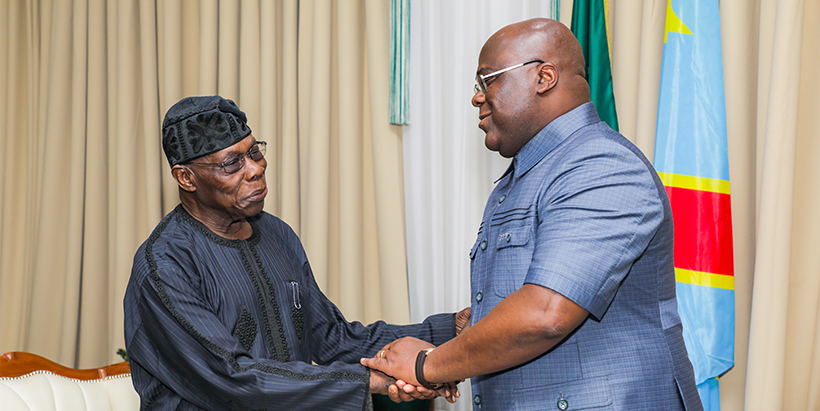
President Félix Tshisekedi welcomed former Nigerian leader Olusegun Obasanjo to the Congolese capital on Wednesday, June 25, as diplomatic efforts intensify to resolve the escalating security crisis in the country’s eastern provinces.
Obasanjo, one of five former African heads of state appointed by the East African Community (EAC) and the Southern African Development Community (SADC) as regional facilitators, arrived in Kinshasa after holding discussions in Rwanda.
His mission is part of a broader continental push to de-escalate tensions between the Democratic Republic of Congo and its eastern neighbour.
“We are exploring all options regarding the situation between Rwanda and the DRC so that there is no more military confrontation and violence,” said Obasanjo following his meeting with President Tshisekedi.
“The discussions I had with my two brothers from Rwanda and the DRC are on the right track.”
Obasanjo’s diplomatic shuttle is part of an EAC-SADC roadmap adopted at a joint summit on March 24, which was attended by President Tshisekedi.
The summit resulted in the appointment of five African statespersons to mediate and steer dialogue aimed at ending the protracted conflict in eastern Congo.
Alongside Obasanjo, the panel includes Kgalema Motlanthe of South Africa, Catherine Samba Panza of the Central African Republic, Sahle-Work Zewde of Ethiopia, and a representative from Kenya.
After his Kinshasa visit, Obasanjo announced his next stop would be Lomé, where he will brief Togolese President Faure Gnassingbé. “We have a mediator appointed by the African Union in the person of Faure Gnassingbé, President of the Togolese Council of Ministers.
I will go to Lomé to report to him and see what needs to be done for lasting peace in the region,” Obasanjo explained.
The eastern DRC continues to suffer from armed insurgencies and cross-border tensions, particularly with Rwanda, which Kinshasa accuses of backing rebel movements—an allegation Kigali denies.
The region remains one of Africa’s most volatile flashpoints, with millions displaced and persistent violence undermining stability.
Regional and international stakeholders hope this new wave of African-led diplomacy will open the door to a sustainable resolution and end decades of cyclical unrest in the Great Lakes region.



